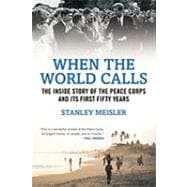
| Introduction | p. ix |
| The Challenge from JFK | p. 1 |
| Sarge's Peace Corps | p. 12 |
| The Pioneer Volunteers and the Postcard | p. 29 |
| The Battle of Britain | p. 45 |
| Friday, November 22, 1963 | p. 59 |
| U.S. Troops Invade the Dominican Republic | p. 70 |
| Johnny Hood | p. 87 |
| The Specter of Vietnam | p. 95 |
| The Wrath of Richard Nixon | p. 107 |
| The Fall of the Lion of Judah | p. 117 |
| The Militant Sam Brown | p. 129 |
| Mayhem and Illness | p. 136 |
| The Rich Lady in Her First Job for Pay | p. 148 |
| 200,000 Stories | p. 160 |
| A New Name and a New World | p. 169 |
| The Expansive Mood of the Clinton Years | p. 178 |
| The Quiet Bush Years | p. 187 |
| Diplomatic Troubles | p. 197 |
| Obama and the Future | p. 211 |
| Afterword Does the Peace Corps Do Any Good? | p. 218 |
| Acknowledgments | p. 228 |
| Appendix | p. 230 |
| A Note on Sources | p. 232 |
| Index | p. 253 |
| Table of Contents provided by Ingram. All Rights Reserved. |
The New copy of this book will include any supplemental materials advertised. Please check the title of the book to determine if it should include any access cards, study guides, lab manuals, CDs, etc.
The Used, Rental and eBook copies of this book are not guaranteed to include any supplemental materials. Typically, only the book itself is included. This is true even if the title states it includes any access cards, study guides, lab manuals, CDs, etc.